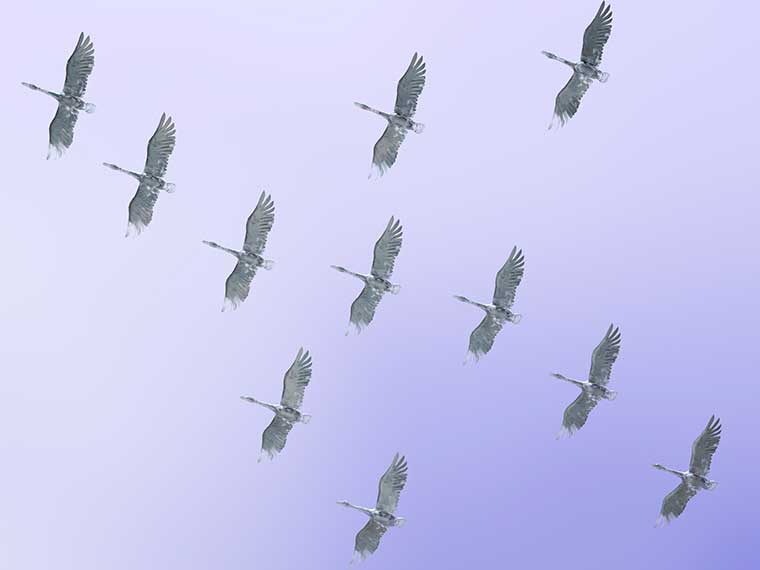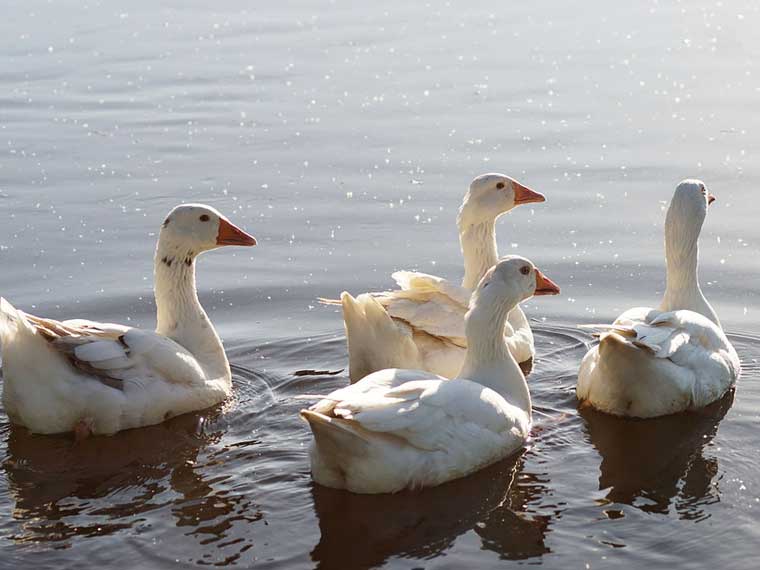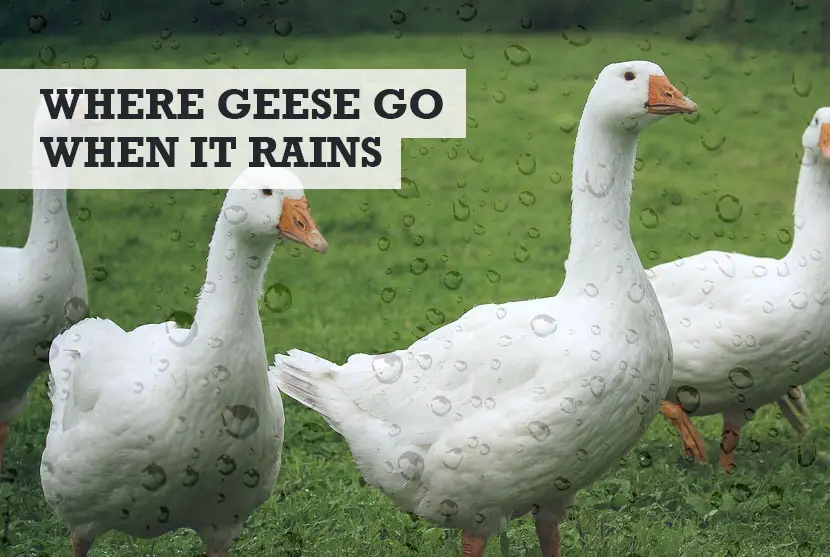If you have ever observed geese in their natural habitat, you might have noticed they tend to disappear once it starts to rain heavily… and who can blame them. Have you ever wondered what geese do in the rain though? I’ve got all the answer for you.
Where do geese go when it rains? In light to moderate rain, geese will continue to go about their daily life, and will still fly when it’s rain lightly. However, in heavy rain and storms, geese might go and seek shelter in their nests, away from the heavy rain.
Where do geese go when it is raining?
Hunters who observe geese in varied weather conditions report that geese are able to ignore a mild to moderate rain and continue their normal activities. Geese may linger longer on the nest in the morning and may spend the day grazing.
At night, the denser air and higher-pressure during rain helps geese fly easier and more efficiently, so geese tend to continue their migration uninhibited by rain – when they’re not sleeping of course.

Do geese fly when it’s raining?
In light rain, geese will continue to fly. However, a major storm will alter the flock’s travel plans and the geese will fly away from the rain. Geese often nest in advance of an incoming storm front. Coastland marshes and inland wetlands provide shelter from high winds, as well as cover from predators.
During large storms and heavy rain, geese will seem to disappear, as they will be riding out the storm in natural shelters and nest areas.
Geese can also use the opportunity of a high pressure front moving into an area to fly high and achieve great distances. Ducks Unlimited, the large conservation and hunting organization based in the United States, reports on a rare gathering of ducks and geese in advance of a storm:
On rare occasions, when conditions are just right, waterfowl migrate south en masse in a phenomenon known as a “grand passage.” Such an event occurred in November 1995 when a powerful cold front and storm system hit the northern Great Plains, where large concentrations of waterfowl were staging. The flocks of ducks and geese moving ahead of this storm were so dense that radar systems at several major midwestern airports couldn’t distinguish the birds from airplanes, forcing dozens of commercial flights to be grounded or rerouted.
That concentration of waterfowl, high in the air, must have been quite a sight! Once they are overtaken by a storm or cold front, however, the birds will ground and huddle together for warmth.
Geese and ducks have been used to forecast the weather for a long time. The Old Farmers Almanac noted that geese and ducks can be seen flying very high in tight formation during high pressure.
Usually that indicates fair weather but can also indicate an advancing storm or cold front, as noted by Ducks Unlimited during the 1995 event. When the barometric pressure drops, geese will fly lower as the pressure is densest close to the ground.
So, where would geese be found during a hard rain? Usually on a nest close to a lake or waterway.

Do geese like the rain?
For geese, a cool, rainy day is perfect. The cooler, denser air makes flying easier. Denser air provides more lift, so flying requires less effort. Nonmigratory birds in urban settings also enjoy rainy weather.
There are less people in the parks and lakes where these urban birds live. Their preferred food, grasses and aquatic plants, are crisp and delicious, and other foods they enjoy, like snails and slugs, are also more available in the rain.
Altogether, I would agree that yes, geese enjoy the rainy days.
Can I leave my geese outside at night?
Yes, geese are well adaptable to staying outdoors at night, even with some rain. Geese are used to cold and rainy weather. Their layer of body fat and thick down with oily feathers protect them from cold and rain. However, geese flock together in extreme temperatures.
Each goose depends on the presence of the flock for warmth and protection from the wind. A solitary goose, or even a pair of geese, cannot provide the needed warmth in extreme cold. In temperatures below freezing, geese benefit from shelter.
How cold can geese survive?
Most breeds of geese feel the cold when the temperature is below freezing. A few breeds, like the hearty northern breed Pilgrim Geese, can live comfortably outside in sub-zero temperatures.
However, most breeds benefit from shelter, food, and water. Birds that are suffering from cold will shift position constantly, trying to get comfortable. With prolonged exposure, they will get frostbite on their legs and feet.
Extreme cold can even lead to death in geese. As long as food, water, and shelter are available, geese weather the cold with no problems.
Geese nesting habits relating to the rain
Geese are mature at 2 to 3 years old. Shortly after reaching maturity, they will mate. Geese stay with their chosen mate for life, up to 25 years. Should one goose die, the surviving partner will choose a new mate. The new pair often uses the same nesting site.
Both male and female will help with nestbuilding. The nest is pretty basic, just a depression in the ground lined with sticks, lichen, moss, and twigs, usually near water. Hens begin laying eggs every 2 days following mating.
With continued mating, they can lay as many as 9 eggs, but 5 or 6 is more typical. The female remains on the nest, incubating the eggs with her body heat, while the male guards her and provides food.
Chicks hatch in about 30 days, depending on the species. During the first 10 weeks of life, the parents and other adult geese will teach them all the necessary behaviors to survive. They learn to eat, drink, swim, and fly in a group, called a creche.
The geese will nest to give it as much shelter from the rain as they possibly can.
Did You Know? It’s not uncommon for geese to sit on dead eggs for days at a time!
Geese migrations during rain
Geese can migrate as much as 5000 miles, following the same routes each year. Geese learn the migration route during their first year. If they fail to learn it that year, they will never migrate.
Migrating geese stop at the same places each year but are able to alter their route when necessary. Once altered, the route will stay the same until circumstances again force them to change their route or stops.
Geese are good team members while migrating. If a bird is sick or injured and falls out of formation, 2 other birds will stay with it until it can continue.
If there is a storm and rain, they might pause to seek shelter.
Why are geese so noisy?
Geese communicate a lot of information with their noise! When flying, they maintain contact with each other with their continuous honking. That allows them to fly in formation and keep track of each other, even in the dark.
Geese communicate more than their location, however. The other geese honk to remind the leader that he or she are part of a team with the same goal, and to encourage maximum effort. You can read more about this in my guide to geese honking during flight.
When the leader tires, another goose will take over the arduous task. So the honking of geese is more than noise. It is an essential part of their migration.
Conclusion
The bottom line is that geese aren’t really that bothered about rain unless it’s very heavy rainfall. In cases like this, geese won’t be able to fly in rain if there feathers get too drenched and heavy.
You might also like…
- How long you can expect your domesticated goose to live
- The reason behind goose aggression during feeding
- Some people believe geese are able to actually kill!
Image in header via https://pixabay.com/photos/geese-white-poultry-birds-farm-2655516/

